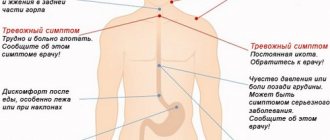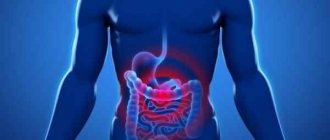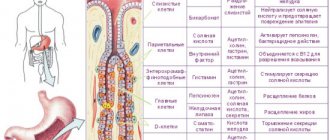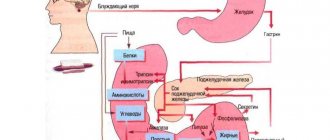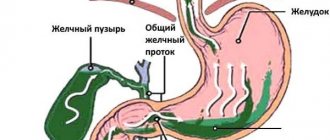Many people are familiar firsthand with such a nuisance as air in the stomach. This is a fairly common pathology. Very few people, unfortunately, pay attention to this problem. This physiological process in medical practice refers to functional disorders of the gastrointestinal system and is called “aerophagy” in scientific terminology. Aerophagia is manifested by uncomfortable sensations in the upper gastric sections, unpleasant fullness of the digestive organ.
The mechanism of development of the pathology is as follows: due to excessive swallowing of air or increased gas formation in the stomach, intragastric pressure increases, which causes the muscles of the organ to simultaneously contract. In this case, the cardiac sphincter relaxes, but the pylorus contracts.
Characteristic symptoms of air in the stomach are bad breath and belching. Swallowing too much oxygen or excessive gas formation in the stomach can cause a lot of inconvenience to a person, but ignoring the problem can lead to the most unpleasant consequences.
Causes of pathology
Let's take a closer look at the causes of air in the stomach. Ingesting it when eating is a fairly characteristic sign that plays a positive role for the proper functioning of the digestive tract. Thanks to the air, favorable pressure in the stomach is ensured. But some people may take in excess air with their food, more than is necessary to maintain gastric health. In such a situation, the pressure inside the stomach of a child or adult rises, causing a whole range of different ailments. For example, excess air volume can cause bloating or flatulence.
Why air collects in the stomach is of interest to many.
It is necessary to mention the presence of belching. The human body, which has accumulated air, can eventually release it through the mouth. Air leaving the stomach through the mouth is characteristic of any person, but healthy people do not pay attention to this process, since it does not have any obvious features. The presence of belching indicates that the body is experiencing pathological disturbances during this period.
There are two types of belching:
- One-time - observed after eating a specific dish that causes unpleasant consequences. In this case, it is worth paying attention to your diet and excluding from it foods that contribute to the occurrence of belching in humans.
- Constant is the main symptom of the development of aerophagia, since it occurs after almost every meal. If such a pathology appears, you should immediately go to a medical facility, where the necessary treatment will be prescribed and medications will be prescribed. An integral part of therapy is adherence to a strict diet.
The presence of an unpleasant odor from the oral cavity is a symptom of aerophagia, associated primarily with belching, which provokes the appearance of pathology. Pain in the stomach, a feeling of bloating, or the appearance of other uncomfortable sensations call into question the presence of aerophagia.
What helps cause burping
With normal functioning of the organs and proper nutrition, belching is empty and occurs rarely. Gases are produced when food is broken down, and air is swallowed at the same time as food. Therefore, belching appears precisely after a meal.
If you experience flatulence, bloating and other negative symptoms, and gases and excess air do not leave the body, you can alleviate the condition by artificially inducing belching.
Food
It is caused by certain foods. If a person cannot burp air from the stomach, you can drink any carbonated drink. This needs to be done in one gulp, quickly. It is recommended to drink at least half a glass, or better yet, a whole glass.
However, this method has contraindications for impaired gastric motility. Otherwise, the unpleasant symptoms will only intensify. For belching to appear in your diet, it is advisable to include as much as possible:
- pears;
- legumes;
- cucumbers;
- cabbage;
- apples
They contribute to excessive gas formation in the stomach, which will cause belching. Sometimes fiber helps restore gastric motility. Another way is chewing gum or sucking pills. They promote swallowing air and causing belching. It is also caused by fruit jelly.
Medications
Some antacids can help with belching. They are designed to regulate stomach acidity levels. However, you can take medications only after consulting a doctor. Sometimes the reason why there is no belching is atony (when the stomach “stands still”). In this case, medications may be prescribed:
- "Pancreatin" helps improve digestion. When the stomach stops, adults are prescribed 2 tablets per day. They should be taken during meals and washed down with water.
- “Festal”, “Mezim” and “Creon” are analogues of “Pancreatin”. They have the same effect.
- "Somilaza" is taken by adults, a couple of tablets daily, with meals.
- “No-Shpa” and “Drotaverine” relieve spasm of the esophagus. Adults are prescribed two tablets.
- The dosage of activated carbon is calculated based on body weight. For every 10 kilograms – one tablet.
As first aid, you can take three drugs at once (one pill each) - Mezim, Drotaverine and activated carbon. Uncontrolled use of medications and incorrect dosages will only aggravate the poor condition and concomitant diseases. In addition, many products have a number of contraindications. For example, Pancreatin should not be taken for hepatitis, diabetes, or exacerbations of gastritis.
Exercises
To cause regurgitation to occur, you can change your body position. For example, bending from a standing position. This will increase the pressure on your stomach. For anatomical discharge of gases, the anatomical position is adopted. You can also perform a number of other exercises from the following table.
| Respiratory | If the air does not come out, then you need to take several deep breaths. Then you should hold your breath as much as possible. In this case, it is advisable to strain the throat muscles as much as possible. Make several swallowing movements. At the same time, tense the abdominal muscles and finally exhale, pushing out the accumulated air. The exercise is difficult and may not work out the first time. Therefore, several repetitions are recommended. |
| Drink exercise | From a standing position, bend over (put a glass of carbonated mineral water on the bedside table in advance) and, after taking a small sip of water, straighten up. Only then swallow the mineral water. After some time, regurgitation will appear. |
| Physical | 1. Some physical exercises help specifically induce belching. For example, you need to lie on your stomach and start rolling from one side to the other. Or make movements simulating a massage. 2. Smile with closed lips. Relax your throat and suck in air through your mouth. This must be done correctly, pressing your tongue to the upper palate. The air is swallowed carefully. If done quickly, it may cause chest pain. When exhaling, release air from the throat very slowly. 3. Exhale all the air, then sharply inhale it as much as possible again. Repeat a couple of times. This will cause artificial regurgitation. 4. Begin to slowly release air from yourself, while tensing the muscles of the diaphragm and abdomen. This promotes intense regurgitation. |
When you don’t have time to do a simple set of exercises, you can simply squat or jump.
Types of aerophagia
Like most other diseases, aerophagia does not have precisely established causes of the pathology. That is why a classification has been developed in medicine, covering different reasons for the appearance of air in the stomach.
Currently there are three types of pathology:
- Aerophagia is neurological, which, as its name suggests, occurs due to prolonged nervous disorders and nervous breakdowns. It must be said that the neurological type of the disease is widespread in the world.
- Traditional aerophagia occurs as a consequence of other diseases, for example, ulcers, gastritis. The causes may also be pathologies of the oral cavity, respiratory tract, heart and other inflammatory processes.
- Causal aerophagia occurs sporadically. It can be caused by various bad habits, accompanied by swallowing large quantities of saliva or air.
What causes air in the stomach after eating?
Nutrition
Very often, an incorrect diet becomes the cause of the emergence and development of a wide range of pathologies, and not only of the digestive tract. The most common foods that cause the sensation of air in the stomach in excess quantities have been identified by experts. These include:
- carbonated soft drinks;
- rolls and bread;
- champagne;
- fruits;
- cabbage;
- legumes;
- chewing gum.
All of these products produce gases when they enter the stomach. This is why excessive consumption of such foods and drinks can cause air in the stomach.
Foods that cause bloating
It is advisable to remove the following products from the diet or reduce their consumption:
- Legumes. The body spends a lot of energy and effort processing the sugar contained in legumes. As a result, increased gas formation occurs and the abdomen becomes bloated. The consumption of peas, beans, etc. should be reduced.
- Dairy products. People often experience milk sugar intolerance. This means that the digestive system lacks the enzyme necessary to break down lactose. An unpleasant symptom occurs. Today, manufacturers offer a wide selection of lactose-free dairy products.
- Cabbage, broccoli, asparagus. Greens are good for the body. But you need to be careful when consuming these products. The raffinose they contain is not digested in the stomach and its thin section. Its breakdown occurs in the large intestine. There is bloating and discomfort in the abdominal area. Boiled vegetables are easier to digest than fresh ones.
- Fast food and fast food. As a rule, these dishes contain a large amount of sodium. Therefore, their consumption is reduced to a minimum.
- Chewing gum. Rubber products contain sorbitol. The element provokes not only gas formation, but also an upset of the digestive system.
- Apples. The fruit contains glucose. Sometimes the body cannot digest it. High fiber content contributes to bloating and discomfort. At the same time, apples are recognized as a source of nutrients and cannot be completely abandoned. 1 apple a day is enough for normal digestion and replenishment of essential vitamins and minerals.
- Sparkling water and drinks. It is advisable to completely exclude it from the diet. Carbon dioxide accumulates in the stomach, swells and bursts. The functioning of the organ is disrupted; excess air does not escape. Nausea, heaviness, and swelling may appear.
- Heavy meals. Fatty foods are difficult for the digestive system to digest, take a long time to digest and are not completely broken down. The formation of excess gas in the intestines and stomach is provoked, and bloating is felt.
Other causes of pathology
There is a whole list of other reasons, which are a kind of habits that provoke increased gas formation in the human body. For example, smoking after eating has a negative effect on the stomach in the following ways. The first thing you swallow when smoking is extra air. In addition, nicotine has a negative effect on the stomach, which causes belching and pain.
The process of eating food and its absorption in the body must be treated very carefully, since trouble can await any person even when there are no prerequisites. Taking a bath immediately after eating increases blood flow in the extremities due to a decrease in current in the gastric region. Those who like to sleep immediately after eating should also be on guard, since the body slows down the digestive process during sleep, ultimately causing discomfort.
There are several other causes of pathology:
- talking while eating;
- fast eating;
- eating too much;
- playing sports after eating;
- second trimester of pregnancy.
Due to all of the above reasons, excess air enters the human stomach, so you need to be responsible and attentive to the process of eating and refrain from certain types of activities immediately after eating.
Changes in the abdomen
Don't expect your belly to start growing in the first weeks of pregnancy. Before a visual change can be noticed, at least 3.5 months must pass. The belly in early pregnancy may increase only due to bloating and digestive problems, which is typical for many women. In some cases, a woman’s appetite increases and she gains weight, which also affects her stomach. It is necessary to adhere to proper nutrition immediately after conception.
Already a few weeks after conception, you may feel mild pain in the lower abdomen. This is explained by swelling of the uterus, which provokes unpleasant symptoms. During a normal pregnancy, a woman does not suffer from severe pain or other unbearable discomfort. Nagging pain most often appears at the time of changing body position and physical activity.
Gases as a symptom of disease
Excessive air in the stomach after eating may indicate the presence of certain diseases in the body.
This phenomenon is often observed with inflammation of the mucous membrane of the organ, which develops against the background of the following health problems:
- peptic ulcer;
- functioning of the bacterium Helicobacter Pilori, that is, gastritis;
- hiatal hernia;
- Zenker's diverticulum;
- reflux esophagitis;
- scleroderma of the esophagus;
- achalasia cardia;
- pyloric stenosis;
- diseases of the cardiovascular system (angina pectoris, myocardial infarction, etc.);
- pathologies of the gallbladder and liver (pancreatitis, cholecystitis, cirrhosis, etc.).
There is also neurotic aerophagia, in which the patient voluntarily swallows a large amount of air, regardless of physical activity, bad habits or food intake. Its symptoms intensify with stress and emotional tension.
Air in the stomach and a lump in the throat often accompany each other.
Diagnostics
- compiling an anamnesis based on the patient’s medical history and complaints;
- laboratory tests: biochemistry, clinical blood test, fecal occult blood test, coprogram;
- instrumental methods (ultrasound, CT, X-ray, endoscopy, etc.) to establish a more accurate diagnosis if a disease in the gastrointestinal tract is suspected.
You can determine the presence of inflammation of the esophagus yourself by the characteristic symptoms. However, to choose the right treatment, you need to determine the root cause. To do this, you should seek help from specialists.
Making a diagnosis begins with a conversation. The specialist evaluates the clinical picture, listens to complaints, as well as the version of the appearance of symptoms. Performs abdominal palpation. In conclusion, he makes an assumption about a possible diagnosis and prescribes an examination.
It is mandatory to take blood, urine, and feces tests. A general blood test allows you to determine the presence of an inflammatory process in the body, a biochemical test evaluates the functioning of certain internal organs. Urinalysis makes it possible to assess the functioning of the excretory system. Feces can tell about the presence of parasites in the body, internal bleeding, and the ability of the intestines to digest food.
The main diagnostic method is endoscopic examination. A special device is inserted into the esophagus through the mouth, allowing images to be transmitted to the monitor screen. During the study, the stage of the disease, type, and severity are determined. If there are ulcerative formations, material is taken for another research method - biopsy.
Symptoms
It is necessary to pay attention to the signs that occur with a pathology such as aerophagia. If one of the symptoms listed below appears, it is recommended to visit a gastroenterologist. Characteristic signs of air in the stomach are:
- feeling of bloating;
- constant belching, lump in throat after every meal;
- tingling in the heart area;
- feeling of oxygen deficiency during breathing;
- flatulence;
- rumbling in the stomach, accompanied by a lack of peace and discomfort;
- stomach pains of various types.
In order not to be exposed to an unpleasant pathology, it is necessary to pay attention to existing preventive measures. Naturally, for a healthy person, constant dietary restrictions are not the most pleasant option, given how much delicious food exists in the world. Therefore, you need to abstain from undesirable foods and get rid of bad habits, if possible, while simultaneously instilling useful ones in yourself.
How to get rid of pain and air in the stomach?
Treatment
First of all, the correct therapy for aerophagia is determined by the cause of the occurrence and further development of the pathology. The important point is that if the disease is caused by disorders of the nervous system, treatment should be carried out under medical supervision in accordance with all instructions. In such a situation, self-medication can worsen the patient's condition, negatively affecting his health.
Causal aerophagia can be cured independently at home, since it is episodic in nature and, by and large, is not a disease as such. Those patients who suffer from this type of illness need to carefully plan their diet and not eat foods that cause excessive gas formation and further belching. For a while, it is worth giving up any carbonated drinks altogether, and eliminating chewing gum, which promotes the release of excess saliva.
To eliminate this pathology, you need to avoid physical activity immediately after eating. In addition, it is not advisable to drink water or tea immediately after eating. This also has a negative effect on the body, and therefore it is advisable to wait a while after eating (from half an hour), setting aside a cup of tea for this period of time.
In general, all habits that adversely affect the activity of the gastrointestinal tract, outlined above, should be strived to be eliminated and not forgotten about their negative impact.
After a short time of abstaining from undesirable habits, aerophagia of the cause-and-effect type will no longer bother the patient. The most important thing is not to provoke your body into excessive gas formation in the future.
How else to get rid of air accumulation in the stomach?
Recommendations for pregnant women with clicking in the abdomen
If at the last stage of pregnancy something clicks, then first of all you need to calm down and not panic. In most cases, the appearance of these sounds is physiological and does not pose any danger to mother and baby. If unpleasant accompanying symptoms occur, you should consult a doctor to determine their cause. If a pregnant woman is very concerned about the appearance of clicking, she should consult a doctor to make sure that everything is fine with the baby and restore peace of mind.
You can share the article with friends via social media. networks:
Most women feel pregnant even before two lines appear on the test. Hormonal changes occur that affect the body in one way or another. It is very important to know which signs are positive and what to be wary of, as well as what sensations a woman experiences in the early stages of pregnancy.
Treatment with medications
Naturally, the best option for getting rid of any disease is to contact medical institutions with appropriate specialists. However, you can get rid of aerophagia with the help of drugs that can be bought and taken without a doctor's prescription. Activated carbon or Smecta cope with this task perfectly. It is advisable to take these medications during overeating. In addition, doctors recommend magnesia as an auxiliary therapeutic method.
Simethicone successfully copes with gas formation, affecting the intestinal and gastric walls, reducing the formation of gases and stabilizing the activity of the gastrointestinal tract. To artificially break down non-absorbable carbohydrates found in foods, you can take dietary supplements with enzymes.
The accumulation of gastric air thus becomes an unpleasant pathology, which can develop on the basis of another disease or cause excessive formation of gases in the human body. If you start treatment on time, you can get rid of such a disease with minimal expenditure of financial resources and in a short time. If self-therapy does not give the desired effect, a rational decision would be to visit a doctor who will choose the right course of treatment individually for each patient.
How to get rid of air in the stomach using traditional methods?
Physical exercises to prevent and combat flatulence
Diet alone does not always contribute to the successful passage of gases. If you know for sure that the cause of flatulence is not pregnancy, then you can additionally try to perform special exercises.
The best way to get rid of gas is to bend over so that the top of your head is looking at the floor and try to touch your toes to your feet. In yoga, this position is called uttanasana. It is in this position that the abdomen and esophagus are gently compressed, which ultimately leads to the passage of gas.
A side effect of uttanasana can be involuntary belching. Therefore, it is worth trying to cope with flatulence in another way: get on all fours, making sure that your knees are apart and your heels are brought together. Place your hands on a special foam roller or long bodybar and gently roll forward until your torso is completely straightened. Then slowly return to the starting position.
This simple exercise allows gas bubbles to escape naturally. Naturally, physical exercise (even such simple ones) should not be performed if diarrhea has developed.
The most effective way to reduce gas formation and prevent flatulence is massage. You just need to massage your stomach in a circular motion. By the way, this method is effective if the baby suffers from colic. Additionally, you can apply a warm heating pad to your stomach.
Traditional methods
Traditional medicine also has its own methods of combating such pathology in patients. Its adherents recommend drinking onion juice, which improves the functioning of the stomach. For this purpose, you need to squeeze the juice of one large onion, mix it with beet juice in a 1:1 ratio, add a few drops of lemon juice. The resulting composition in a volume of thirty milliliters is diluted in half a glass of warm water and taken three times a day before meals.
The activity of the gastrointestinal tract can be improved by herbal infusions and decoctions. The undoubted leaders are ginger, mint leaves, lemon balm, and fennel. An infusion of eucalyptus leaves (one spoon per five hundred milliliters of boiling water) is quite effective; it should be drunk twice a day. Simple and accessible parsley will save you from air in the stomach: fresh herbs are chopped and poured with boiling water for eight hours, then taken throughout the day as desired.
Possible consequences
A pathology such as the accumulation of air in the stomach or aerophagia is not always as harmless as it might seem. The danger of the disease lies in the fact that the air accumulated in the stomach begins to put pressure on the internal organs located nearby. In turn, this will definitely affect the cardiovascular system. In addition, the combination of aerophagia with other symptoms may indicate the presence and progression of certain diseases.
The worst thing is excessive gas formation during pregnancy. Accumulated gases, causing a feeling of fullness in the stomach, can cause a missed pregnancy or spontaneous miscarriage.
Such cases are rare in medicine, but there is still no need to take risks. In the first trimester, the appearance of pathology is a fairly rare occurrence; in the second and third, it affects every second woman, and it is scary and painful for her. The consequence of negligent attitude towards health is harm to the mature baby. A timely visit to the doctor will help prevent negative consequences.
We looked at such a pathology as excessive accumulation of air in the stomach. Causes and treatment are described.
